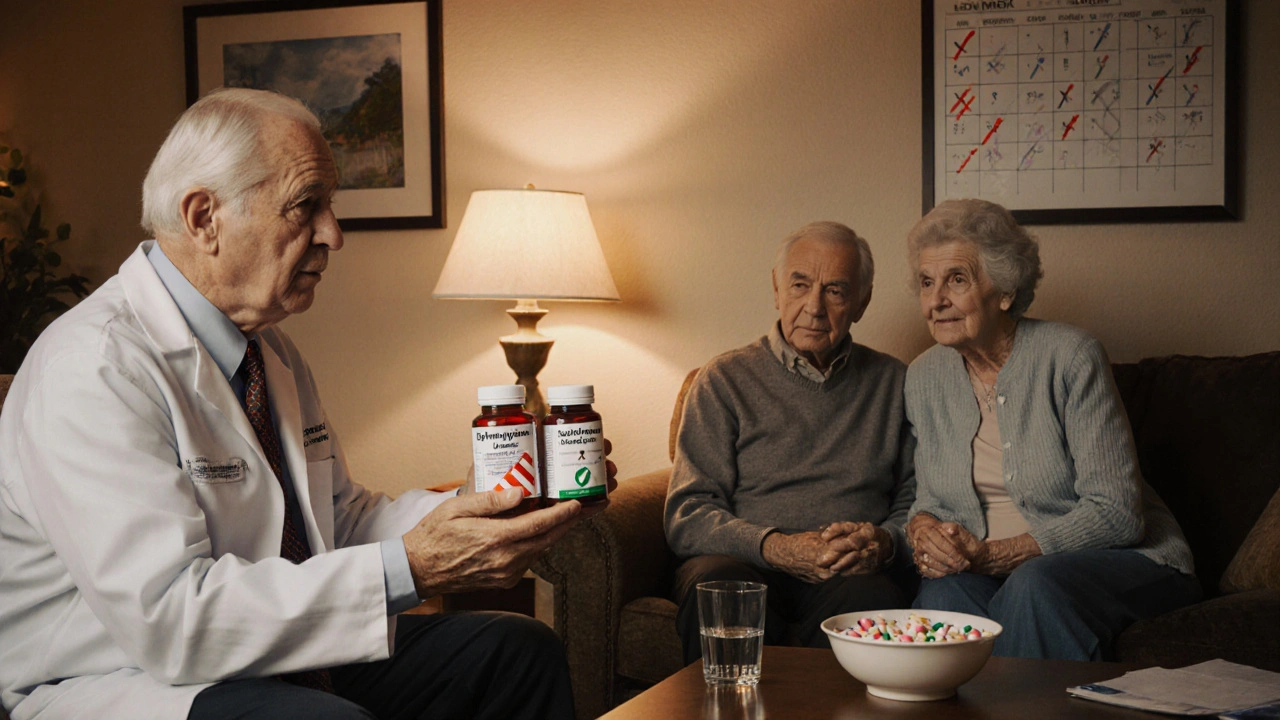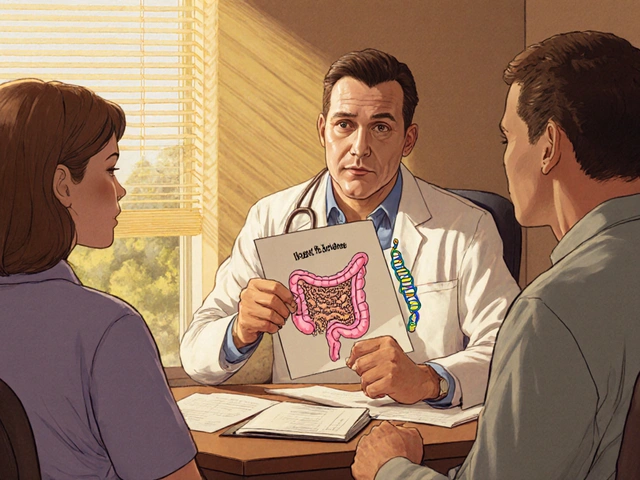Antihistamine Side Effect Comparison Tool
Compare Your Antihistamine Risk
Select the type of antihistamine you're using to see your risk of side effects like dry mouth, constipation, urinary issues, and cognitive impact.
Side Effect Comparison
-
Dry Mouth
High risk
-
Constipation
High risk
-
Urinary Issues
High risk
-
Cognitive Impact
Moderate risk
-
Fall Risk
Moderate risk
Anticholinergic Cognitive Burden Score
3.0 (High Risk)
The American Geriatrics Society rates this as the highest risk level for cognitive impairment and dementia.
Key Information
Long-term use of first-generation antihistamines is associated with a 54% increased risk of dementia over 7 years.
For seniors, there's a 31% chance of urinary retention within 48 hours of use if you have existing prostate issues.
Second-generation antihistamines have a 31% chance of urinary retention within 48 hours of use if you have existing prostate issues.
What You Should Do
- For allergy relief: Switch to second-generation antihistamines like loratadine or fexofenadine
- For sleep: Consider melatonin or good sleep hygiene instead of antihistamines
- For seniors: Avoid first-generation antihistamines entirely
- If you must use: Use the lowest effective dose and never exceed 3-5 days without consulting a doctor
Many people reach for antihistamines like Benadryl for allergies, colds, or even sleep. But what they don’t realize is that these common pills come with hidden side effects that can seriously disrupt daily life-dry mouth, trouble going to the bathroom, and difficulty urinating. These aren’t just minor annoyances. They’re signs of something deeper: anticholinergic effects.
What Are Anticholinergic Effects?
Anticholinergic effects happen when a drug blocks acetylcholine, a chemical in your body that tells your muscles and organs what to do. Histamine blockers like diphenhydramine and chlorpheniramine were designed to fight allergies, but because they’re chemically similar to older anticholinergic drugs, they accidentally interfere with acetylcholine too. This is especially true for first-generation antihistamines-those you can buy over the counter without a prescription.Think of your body like a network of switches. Acetylcholine flips the switch to make your saliva flow, your gut move, and your bladder empty. When antihistamines block those switches, things slow down-or stop. That’s why dry mouth, constipation, and urinary issues show up so often.
Dry Mouth: More Than Just Uncomfortable
Dry mouth isn’t just about needing to sip water all day. When anticholinergic antihistamines block M3 receptors in your salivary glands, saliva production drops by 60-70%. That’s not dehydration. That’s a direct drug effect.People report needing to carry water everywhere, waking up with a cottony throat, or struggling to swallow food. Over time, this increases the risk of cavities, gum disease, and oral infections. The American Dental Association recommends chewing sugar-free gum with xylitol to stimulate saliva-just 5 minutes of chewing can boost flow by 40-60%. But the real fix? Switching to a second-generation antihistamine like loratadine or fexofenadine, where dry mouth affects only 2-4% of users instead of nearly 30%.
Constipation: When Your Gut Just Stops
Your digestive system relies on acetylcholine to keep things moving. Block that signal, and bowel movements slow down. Studies show first-generation antihistamines can increase transit time by 1.5 to 2 times normal. That means food lingers longer, water gets absorbed, and stools harden.Up to 20% of people taking diphenhydramine report constipation. For older adults or those with existing bowel issues, this can lead to dangerous complications like fecal impaction. The American Gastroenterological Association suggests taking a daily dose of polyethylene glycol (17g) as a preventive measure if you must use these drugs. But again, the best solution is avoiding them altogether. Cetirizine and loratadine cause constipation in only 3-5% of users-less than half the rate of their older cousins.

Urinary Issues: A Silent Risk, Especially for Men
This one is often overlooked until it becomes an emergency. Anticholinergic drugs tighten the urethral sphincter and weaken the bladder’s ability to contract. For men with enlarged prostates, this can trigger acute urinary retention-where you simply can’t pee at all.Studies show that men with an International Prostate Symptom Score above 8 have a 31% chance of sudden urinary retention within 48 hours of taking a first-generation antihistamine. That’s not rare. That’s a medical emergency requiring catheterization. Even in women, reduced bladder control can lead to discomfort, frequent urges, or accidents. The American Urological Association explicitly advises against using these drugs in anyone with existing urinary symptoms. Second-generation antihistamines? Less than 1% risk.
Why Do Some Antihistamines Cause This-and Others Don’t?
It’s all about chemistry. First-generation antihistamines like diphenhydramine, promethazine, and hydroxyzine cross the blood-brain barrier easily and bind strongly to muscarinic receptors. Their Ki value for M1 receptors is around 87 nM-close enough to their histamine-blocking strength to cause real side effects.Second-generation antihistamines like cetirizine, loratadine, and fexofenadine were designed differently. They’re bulkier molecules that don’t cross into the brain as easily and have almost no affinity for muscarinic receptors. Their M1 receptor Ki values are over 1,000 nM-so high that even at full doses, they barely touch acetylcholine pathways.
That’s why you see such a gap in side effect rates:
| Side Effect | First-Generation (e.g., Diphenhydramine) | Second-Generation (e.g., Loratadine, Fexofenadine) |
|---|---|---|
| Dry Mouth | 25-28% | 2-4% |
| Constipation | 15-20% | 3-5% |
| Urinary Retention (in elderly) | 5-8% | <1% |
| Cognitive Impact (long-term) | High risk | Negligible |

Long-Term Risks: Dementia and Falls
This isn’t just about discomfort. Long-term use of first-generation antihistamines is linked to serious health risks. A landmark study published in JAMA Internal Medicine found that people who took diphenhydramine daily for more than three years had a 54% higher risk of developing dementia over seven years. Each additional year of use over 90 daily doses increased the risk by another 20%.The American Geriatrics Society includes first-generation antihistamines on its Beers Criteria list of medications to avoid in older adults. Why? Because they don’t just cause dry mouth-they fog your brain. The anticholinergic cognitive burden score for diphenhydramine is a 3.0-the highest possible. That’s the same level as some antipsychotics and bladder medications known to cause confusion and memory loss.
And it’s not just memory. A 2023 study from the American Academy of Neurology found that even short-term use (7+ days) of these drugs increases fall risk by 34% in older adults. Combine drowsiness with poor bladder control and dry mouth-induced dizziness, and you’ve got a recipe for hospital visits.
What Should You Do?
If you’re taking diphenhydramine, chlorpheniramine, or promethazine regularly, ask yourself: Is this really helping? Or is it just making things worse?For allergies: Switch to loratadine, cetirizine, or fexofenadine. They work just as well, last 24 hours, and don’t leave you parched or stuck on the toilet.
For sleep: Melatonin, good sleep hygiene, or even low-dose doxylamine (which has less anticholinergic burden than diphenhydramine) are safer bets. Avoid using antihistamines as sleep aids long-term.
For seniors: Avoid first-generation antihistamines entirely. The risks far outweigh any benefit. If your doctor prescribes one, ask why-and if there’s a better option.
When You Can’t Avoid Them
Sometimes, you have no choice. Maybe your insurance won’t cover the newer drugs. Maybe you’re traveling and only have diphenhydramine on hand.Here’s how to reduce harm:
- Use the lowest effective dose. For older adults, start with half the standard dose (12.5 mg instead of 25 mg).
- Never take them daily for more than 3-5 days without checking in with a doctor.
- Stay hydrated, chew xylitol gum, and eat fiber-rich foods to counteract dry mouth and constipation.
- Don’t mix them with other anticholinergic drugs-like some antidepressants, bladder medications, or motion sickness pills. The effects multiply.
The bottom line: Antihistamines aren’t all the same. What works for your neighbor might be dangerous for you. The side effects aren’t just inconvenient-they’re warning signs. And ignoring them can cost you more than just a dry throat.
Are all antihistamines the same when it comes to side effects?
No. First-generation antihistamines like diphenhydramine and chlorpheniramine cause strong anticholinergic effects-dry mouth, constipation, urinary issues, and brain fog. Second-generation antihistamines like loratadine, cetirizine, and fexofenadine were designed to avoid these effects. They’re just as effective for allergies but with far fewer side effects.
Can anticholinergic side effects be reversed?
Yes, once you stop taking the drug, most side effects begin to fade within 24-48 hours. Dry mouth and constipation usually improve quickly. But long-term cognitive effects from years of use may not fully reverse, which is why prevention is critical. If you’ve been using first-generation antihistamines daily for over a year, talk to your doctor about cognitive screening.
Why do some OTC sleep aids still contain diphenhydramine?
Because it’s cheap, effective at causing drowsiness, and still widely used. But that doesn’t make it safe. Many people don’t realize they’re taking an anticholinergic drug every night. The sedation is a side effect-not a therapeutic benefit-and it comes with serious risks, especially for older adults. Safer sleep aids exist, like melatonin or behavioral sleep strategies.
Is it safe to take antihistamines with other medications?
Be very careful. First-generation antihistamines can interact with antidepressants, Parkinson’s meds, bladder control drugs, and even some heart medications-all of which also have anticholinergic properties. Combining them can lead to severe side effects like confusion, rapid heartbeat, or even delirium. Always check with your pharmacist before mixing medications.
What should I do if I experience urinary retention after taking an antihistamine?
Seek medical help immediately. Inability to urinate is a medical emergency. Do not wait. Go to an urgent care center or ER. You may need a catheter to relieve the blockage. Afterward, avoid first-generation antihistamines completely. Your doctor can recommend safer alternatives for allergies or sleep.






Comments
Amber O'Sullivan
7/Nov/2025Why are we still letting Big Pharma sell us poison as a sleep aid? I took Benadryl for years thinking it was harmless just because it’s OTC. Then I started forgetting where I put my keys. Now I’m on loratadine and my brain feels like it’s been unplugged from the wall. Stop normalizing this crap.
Jim Oliver
7/Nov/2025Wow. Just... wow. You actually wrote a 1,200-word essay on anticholinergics, and yet you didn’t mention that diphenhydramine is a known antimuscarinic agent with a Ki of 87 nM at M1 receptors? And you didn’t cite the 2019 JAMA study that showed a 54% increased dementia risk? Amateur hour. If you’re going to write about pharmacology, at least know what you’re talking about.
William Priest
7/Nov/2025lol so u mean like... benadryl is bad for u? no way. i thought it was just a sleepy pill. now i feel like i been lied to my whole life. also why do they still put it in zzzquil??
Ryan Masuga
7/Nov/2025Thank you for sharing this. I’ve been using cetirizine for years and never realized how much better it was until I switched from diphenhydramine. My dry mouth disappeared, my digestion improved, and I actually woke up feeling alert instead of foggy. It’s not about being ‘anti-OTC’-it’s about being informed. You’re doing good work here.
Jennifer Bedrosian
7/Nov/2025OMG I just realized I’ve been taking Benadryl every night for 7 years to sleep. I thought it was helping me but now I’m scared. My mom had dementia and I used to joke that I was following in her footsteps. I’m going to stop tonight. I’m telling everyone I know. This is wild.
Lashonda Rene
7/Nov/2025I’m not a doctor but I’ve been reading a lot about this and I think it’s so important because a lot of people don’t know that just because something is sold in a drugstore doesn’t mean it’s safe. I used to give my dad diphenhydramine because he had trouble sleeping and he’s 72 and he started having trouble peeing and then he fell and broke his hip and now I think it was because of the meds. I didn’t know. I just wanted him to sleep. I wish someone had told me sooner.
Andy Slack
7/Nov/2025This is the kind of post that should be shared everywhere. Seriously. If you’re using OTC sleep aids, stop. Just stop. Your brain isn’t a battery you can drain and recharge. Your body is not a machine that ignores abuse. This isn’t fearmongering. This is science. Share this with your mom. Your dad. Your grandma. Please.
Rashmi Mohapatra
7/Nov/2025Everyone in India uses cetirizine for allergies and sleep. No one uses diphenhydramine here anymore. We know better. Why do Americans still do this? It’s like you love suffering. Also why is everyone so surprised? This has been known since the 80s.
Abigail Chrisma
7/Nov/2025Thank you for writing this with such clarity. I’m a nurse and I see this every day-older patients on multiple anticholinergics, confused, constipated, falling. We try to educate, but the labels don’t warn them. This post should be required reading for anyone over 50. Please keep speaking up.
Ankit Yadav
7/Nov/2025One thing no one mentions: second-gen antihistamines aren’t perfect either. Cetirizine can still cause drowsiness in some people. And fexofenadine? It’s expensive. Insurance won’t cover it. So the real issue isn’t just the drug-it’s the system that makes safe options inaccessible. We need better access, not just better choices.